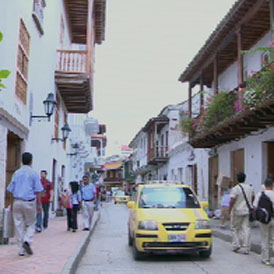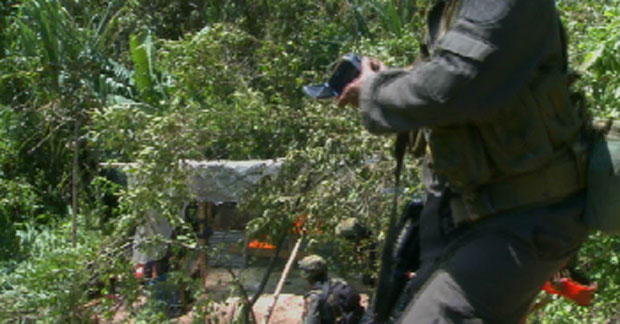UK to blame for agents’ deaths in Colombia, says ex-agent
 Andy Davies
Home Affairs Correspondent
Andy Davies
Home Affairs Correspondent
EXCLUSIVE: The British government is responsible for the deaths of six Colombian informants, claims a customs officer who previously worked in Bogota. Home Affairs Correspondent Andy Davies reports.
‘Mike’, who is 47 and worked for MI6 before joining customs, has told Channel 4 News that the deaths resulted from inadequate safeguards for the informants’ identities.
Speaking publicly for the first time, he has further claimed that during his four-year posting to Colombia, he witnessed an operation which was mismanaged, dysfunctional and marred by a ‘turf war’ between customs and MI6.
These are hugely embarrassing allegations for the government which rarely discloses the nature of its work in Colombia due to concerns over ‘national security’.
Furthermore the claim comes from an officer who, as Channel 4 News has learned, received £790,000 from HM Revenue and Customs (HMRC) earlier this year in an out-of-court settlement after suing them for, among other things, failing to keep him safe from psychiatric harm.
He has been diagnosed with chronic post-traumatic stress disorder (PTSD). It is thought to be the biggest payout of its kind for someone in this field of work.
The former drugs liaison officer (DLO), who joined customs in 1992, was posted to Bogota in 2000, working out of the British embassy within a team of five DLOs.

The job description was, as he puts it, “to stifle the supply of drugs to the UK through the auspices of the UK Drug strategy”. He liaised with local and other foreign counter-narcotics agencies (principally the Dutch and Americans), ran “vetted” units of Colombian agents, and handled informants.
They had notable successes (his biggest seizure of cocaine was six tonnes), but he describes a mission which was hamstrung by incompetence, “nebulous” weapons protocols, and “atrocious” intergovernmental relationships. His most trenchant criticism, however, is reserved for Customs’ covert work with informants.
He estimates that he was in contact with more than 50 informants during his four-year posting, allocating them codenames and occasionally sharing them with other intelligence agencies.
The payouts which led to seizures could be significant, as much as $100,000 for one tip-off, claims Mike.
“He was a good operator,” according to a former drugs officer based in Bogota with a different foreign agency, “he had very good informants and huge results.”
Blood on their hands
Yet Mike, who is fluent in Spanish and whose family joined him in Colombia, feels personally responsible for the deaths of six informants.
He explains that “the decisions made and the rules I was forced to follow in the handling of some informants” led directly to their murders.
But he does not take sole responsibility, arguing that his management, too, “have blood on their hands.”
He cites the case of a small team of informants who, he claims, effectively “outed” one of their own after he’d been given a payment by the British which, says Mike, “did not conform”.
The customs officer says that he had asked his bosses to authorise a specific payment to accommodate the whole team of informants, but when only half the amount was granted, he claims, suspicions were aroused.
When Mike’s contact returned to the group to distribute the proceeds, they accused him of “ripping them off” after having expected a much bigger payout. “Then,” says Mike, “one day he gets back home, his wife and daughter are on the balcony, his two sons are playing football, and a motorbike with two men pulls up and one of them empties a magazine into him”.
The informant was killed instantly.

No control
Another of Mike’s informants, ‘Jesus’, who survived after being exposed by a drugs trafficker, has told Channel 4 News that he too believes his identity was compromised due to British negligence.
In 2002, he claims he was asked by his British handlers to write a statement detailing his covert activities and hand it to a “trusted Colombian official”. He did this. A few days later, however, he says he was confronted in Cartagena by a drugs trafficker who, had got hold of all eight pages of that hugely sensitive statement.
Jesus bluffed that it was a hoax, but the situation was now so dangerous for him that the British relocated him, it is understood, together with his wife and his four children to the UK on 23 July 2002 on a witness protection programme.
He has since returned to Colombia, deeply embittered by what he considers to have been a gross failure on the part of the British government to ensure that his identity as an informant was kept confidential: “I felt betrayed, cheated and very upset, because they got my family involved”.
A senior trusted counter-narcotics officer based with another foreign agency in Bogota at the same time as Mike, has also expressed deep concern to Channel 4 News about the manner in which informants were treated by the British.
He has described their treatment of informants as “very bad”. He also believes strongly that there was a serious lack of oversight by senior bosses of the British drugs officers deployed to Colombia.
“There was no control over Mike” he comments, whom he describes as a credible source.
“I had completely lost the plot”
Customs have declined to respond to these allegations, stating that they never comment on operational matters. Jesus’ account is almost impossible to verify, as are the claims made by Mike concerning the deaths of the six informants, but they raise very serious questions about the manner in which the British government has been conducting its operations in Colombia, a country where it is usually the human rights record of the local security agencies which fails to withstand scrutiny.
Mike, although still technically employed by Customs, is now living overseas and plays no active role in HMRC. He has been on sick pay for the last six years. After he left Colombia in 2004, his life spiralled out of control.
“I had completely lost the plot,” Mike admits.

A marked feature of this case is the struggle which he experienced when trying to get the help he needed from Customs. It’s been claimed HMRC was persistently uncooperative in efforts to get Mike the necessary treatment he needed.
One psychiatrist said: “For someone engaged in this type of employment, there should be adequate assessment and treatment of developing psychological or psychiatric disorders with access to specialist services as necessary. The failure to do this in Mr X’s case has rendered his condition severe and chronic.
“It is my opinion that according to the balance of probabilities Mr X is permanently disabled.”
Mike has been hugely damaged as an individual by his experiences in Colombia. But he remains utterly lucid when recalling his experiences while posted there. His story offers a rare, deeply troubling, insight into a covert war in which our government remains, discreetly, an active participant.
-
Latest news
-
Windrush scandal: returning to the UK after a forty year wait6m

-
Netanyahu ‘survival’ depends on ‘expanding war’ says head of Palestinian National Initiative5m

-
Proposed law change could strip parental rights from paedophiles5m

-
Hugh Grant settles privacy lawsuit against The Sun newspaper publisher2m

-
Post Office Scandal: what did top executive know?6m

-




